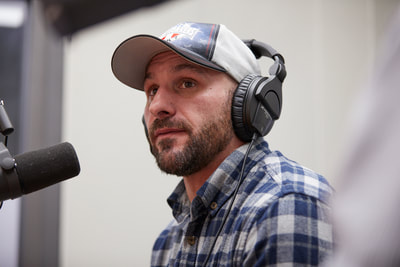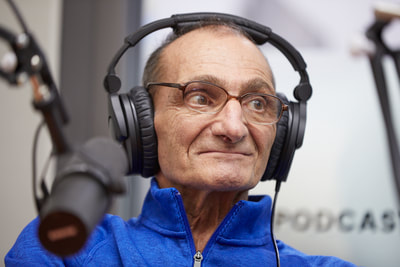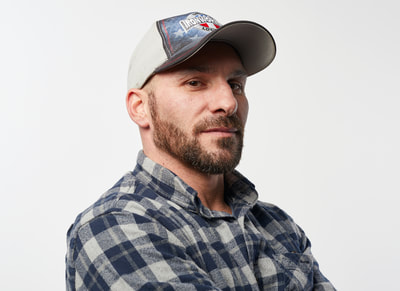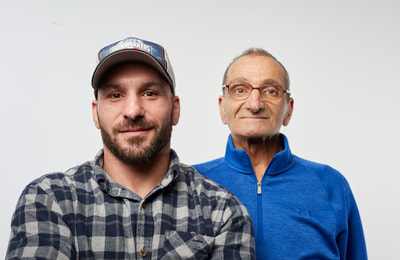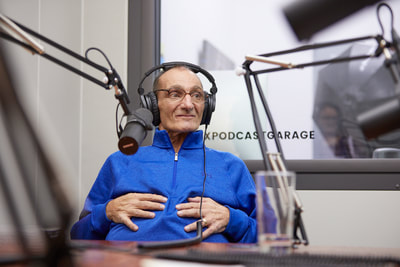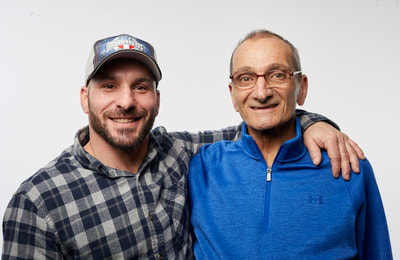Episode 2: Nat
"The hardest thing in prison wasn’t prison. It was dealing with my daughters." From a stranger in the middle of the night, to an unexpected toenail clipper, to an unlikely math lesson, this is the story of Nat Cosenza - and the crime he didn't commit.
|
TRANSCRIPT
NARRATOR This podcast contains explicit language and mature content. This episode includes some discussion of sexual violence. It might not be appropriate for all listeners. NAT The hardest thing in prison wasn’t prison. It was dealing with my daughters. Listening to them on the phone, begging me to come home. It messes you up. Bad. NARRATOR From Boston, Massachusetts, you’re listening to Mass Exoneration. These are the stories of people who were convicted of crimes — crimes they never committed — and what happened next, for them and for the people they had to leave behind. I’m Brian Pilchik. This is Episode 2: Nat. NAT My name is Natale Cosenza, and I spent 16 years in prison for a crime that I did not commit. NARRATOR Natale Cosenza. But, since he was a kid, everyone’s called him Nat. NAT I wasn’t the easiest kid in the world, got in a lot of trouble when I was younger. Didn’t like to listen to nobody. Still don’t. I grew up in Worcester., right on the border of Shrewsbury and Worcester, right off of Route 9. There’s a lake separating the two towns, the City of Worcester and the Town of Shrewsbury. Shrewsbury kids and Worcester kids never got along with each other. I used to fight a lot, get in a lot of fights. I’m a short guy, so I was a short kid. It’s a tough juggling act with not having that short-man syndrome, but knowing that you’re tough at the same time? People tend to pick on you because you’re the smaller guy. NARRATOR And when Nat got into trouble, it was his dad who was there for him. PETER My name is Peter Cosenza. I’m Nat’s father. NAT Me and my father have always been best friends. My whole life. He’s always drop of a hat there for me. I don’t think there’s anybody in the word I trust more than him. It’s always been like that, since I was a kid. I can always count on him. NARRATOR Nat remembers one time, there was a fight; he doesn’t remember exactly what it was about. But the other kids? NAT They ended up calling their fathers down. And all of the sudden this guy comes over to me, starts grabbing me. Big little tussle happened. So I ran inside and just made a phone call to my dad, like dad, this guy’s dad just showed up. Within five minutes he was there for me. Normally, because of all the trouble I got into, it’s always, “What did you do now?” But this was, “What are you doing putting your hands on my kid?” I think that was the real first time I realized how it didn’t matter what I did, how he’d be there for me. NARRATOR Peter taught Nat to stand up for himself. But he also taught him to take responsibility. To apologize if he did something wrong. PETER One day, cop comes walking in the barber shop. And my brain said, “What now?” He goes, “Your son, Nat.” I said, “Boy, what he’d do?” “No, He didn’t do nothing. I ran into him a couple nights ago, there was a little incident. He’s very nice. He apologized. I just want to tell you that. Not many kids that I pick up - I break up the fights - has that.” NARRATOR That kid grew up. And he had kids of his own. By the time he was 26, Nat was raising two little girls. When the police arrested 26-year-old Nat Cosenza, it wasn’t for fighting with the Shrewsbury kids. It was for something much, much worse than that. NAT Assault and battery, dangerous weapon, armed burglary, and assault with intent to rob. NARRATOR It was the summer of 2000, and the Worcester police had been investigating a break-in. NAT Some guy broke into some lady’s apartment and beat her up while she was naked. NARRATOR The woman had woken up in the middle of the night to find a strange man sitting on the floor, in the dark, beside her bed. He started hitting her with a hard object. Then he climbed onto the bed. She kicked him. He ran away. It was all over in a couple of seconds. When the police showed up, she told them that the man in her room was not someone she had recognized. It was a white man. In his twenties. He wasn’t wearing pants, just underwear. He was average height — as she would later clarify, around five foot ten. It wasn’t a lot to go on. But the police started looking for suspects. And a neighbor gave them Nat’s name. Nat lived nearby, in another building in the apartment complex, with his two girls. The neighbor hadn’t been getting along with Nat. He complained to the police. Said Nat might be the guy they’re looking for. Of course, the thing about Nat is, he’s not five foot ten. NAT I’m a short guy. NARRATOR He’s five foot three. The police didn’t care. They started to build a case against him. They put Nat’s picture into a group of nine photos. Those other photos? They were selected because they looked like Nat. The police showed the victim all nine, and they told her that one of them was their suspect. They reminded her someone named Nat Cosenza lived in her complex. They asked her to pick out a photo. She picked out Nat. And then, she became convinced: It was Nat in that dark room. The police arrested him. And they didn’t just accuse him of breaking in, or hitting her. NAT The charge changed from intent to rape. I mean my first reaction is, I kinda flipped out a little bit when I heard that. PETER When I first got wind of it, it was like you were struck by lightning. You just, you can’t think, you can’t breathe, you can’t function. You know? My first instinct is, how do I help? There is no way. NARRATOR The police took Nat to the station. And from the beginning, Nat was insistent that he didn’t do it. But assault with intent to rape — that’s a serious charge. If Nat was found guilty, he could go to prison for 20 years. Unless he took a deal. NAT There’s probably six or seven different plea bargains. NARRATOR Plea bargains. Offers. Deals. Admit you’re guilty; don’t fight it. And in exchange, you’ll go to prison — but only for a little while. Not 20 years. NAT Seven to ten, or eight to ten, or something like that. NARRATOR Seven years, instead of twenty. All he has to do? Say he committed the crime. NAT I’m like, I’m not taking it. NARRATOR Nat thought they’d never prove him guilty. After all, it wasn’t him. And then, the prosecution found something. The victim — the woman who was attacked — she went back to her apartment. NAT Three weeks after the incident, she went through all her clothes, did some laundry, and found a pair of gym shorts. They’re men’s shorts. NARRATOR She turned the shorts over to the police. And the police found semen stains. NAT I mean I made a phone call to my attorney, he tells me about this. So he says, they wanna do a DNA test on them. I’m like, absolutely, bring me in. He goes, wait a minute, let’s discuss — I go there’s nothing to discuss. Let’s, let’s go get the DNA done. NARRATOR So they tested the DNA on the shorts and compared it to Nat’s DNA. NAT Then the DNA came back. It wasn’t me. As soon as I heard that, I’m like, that means I’m out, then. NARRATOR But that’s not how the police and the prosecutor saw it. Sure, the DNA meant that the shorts weren’t Nat’s. But maybe the shorts had nothing to do with the crime. Forget about the shorts. The prosecutor wasn’t dropping the case. But he was offering another deal. NAT When that came back, I think he offered me like a two to three. The last plea they offered me before trial was time served. NARRATOR Time served. If Nat says he’s guilty, he gets let out. Immediately. In exchange for the time he already served in jail, during the long wait for trial. NAT Which was very hard to turn down at that point. NARRATOR He had been in jail for two years. Waiting for trial. NAT And I’ve never been to a trial before. NARRATOR If the trial went bad, he could go to prison for 20 years. Or, he could take the deal. Go home to his daughters. All it would take was saying he was guilty. That he broke into the victim’s apartment and attacked her. This is the biggest decision of Nat’s life. And if he turns down the deal, what is he afraid of? NAT Everything. I mean at this point in my life, I’ve done some time, some county time for stupid stuff. But, now this is big boy stuff. This is state prison. 20 years. It’s a life sentence. Anything over 10 years is a life sentence. I just, I have two daughters, the mother was really never around. At that time they were 2 and 4. I was thinking of them, but I wasn’t thinking of them at the same time. Because if I was thinking of them, I should’ve just took the time served. I could’ve walked right out of the courthouse regardless of whether I did it or not. But at the same time, my pride got the best of me. NARRATOR His dad had taught him that it was important to own up to what you’ve done. If you did it, you apologize. But Nat didn’t do it. He didn’t take the deal. He went to trial. At trial, the prosecution downplayed the significance of the DNA and the shorts. They focused on the photo identification. The victim picked out Nat’s photo. The police said they didn’t pressure her into it. They didn’t help her identify him. She did that on her own. NAT In my head I’m going, ah that’s such B.S., nobody’s gonna believe that. But like I said, I was young, and not experienced as I am now. It was actually a very good choreograph, because everybody’s gonna believe the cops over anybody else on the jury stand. NARRATOR They did. The jury believed the police had solved the case. They found Nat guilty. Guilty of burglary and assault and battery with a dangerous weapon. Not the intent to rape, though. They didn’t convict him of that. The judge sentenced him to state prison. 12 to 20 years. He should’ve taken the deal. Nat was sent to the Department of Correction’s processing unit in Walpole, Massachusetts. That’s where most guys sent to state prison in Massachusetts start off. Everyone just calls it Walpole. NAT Let me explain Walpole real quick. I remember the first time when I first walked into Walpole, I’m not gonna lie, I was scared shitless. Just seeing the bars from the floor to the ceiling, and they’re probably two story ceilings. And it just cuts off right in the middle of the hallway. And you just realize you’re in a whole different animal. You hear all the stories of Walpole, it’s not a not dangerous place, it’s one of the most dangerous places around. NARRATOR He has to learn how to talk inside. There are certain words... NAT Certain words that you don’t use in prison that will get you killed. Simple words. Punk. Bitch. Those words are probably the worst words you can use in prison. Out of all the words in the dictionary, those are the worst two. My second day in Walpole I seen somebody stabbed in the neck with a toenail clipper. You don’t see that! It makes you realize where you actually are and to watch everything you do. I think I survived the way I did in prison because of my father. One of the biggest things he ever taught me is respect. I think that’s why, I don’t if I want to say I adjusted to prison so easily. Because prison is mainly about respect. NARRATOR While Nat was surviving on the inside, someone needed to be taking care of his two daughters, Alisia and Bianca. ALISIA [phone ringing] Hello? BRIAN Hey, Alisia? ALISIA Hi. BRIAN Hey, it’s Brian and Nicole. NICOLE Hello! ALISIA How are you? NICOLE Doing well, how are you? ALISIA My name is Alisia Cosenza. I’m 22 years old, and I’m the daughter of Natale Cosenza. NARRATOR Alisia still remembers what it was like when the police took her dad away. She was 4 years old. ALISIA Well, it was very late at night. I do remember it being super dark. I don’t know if I was in the kitchen when the police came in, but I do remember stepping outside of my room and seeing him in handcuffs. I immediately started screaming and crying, asking where he was going, and there was no one there to tell me what was going on. I just remember a lot of loudness and being very scared and confused, and I had no idea what was going on. NARRATOR Initially, the two girls were going to be taken in by social services. ALISIA My sister and I were brought to the police station after we were found in a trailer park home. We were 4 years old and 2 years old at that time. Social services, family services were there to take my sister and I into foster homes. But my grandfather said that once he saw my face it expressed confusion, and he said I looked really scared. He said that when he looked at me he knew that he had to become our guardian and that he couldn’t walk away with us looking and feeling that way. NARRATOR Her grandfather: Peter. Nat’s parents took custody of the girls. PETER It was a pure pleasure. NAT He did a phenomenal job. PETER No, it was my wife and I, I did the heavy lifting, and she did all the brain work. Thank god for her. What did Alisia do, gymnastics? NAT Soccer, softball a little bit. Mostly soccer. PETER We moved down the Cape. I signed them both up for soccer. The little one just didn’t have the speed, didn’t like it. But Alisia became one of the top players. And then we got into softball. His oldest daughter, she’s a natural talent. ALISIA Oh, I had a great childhood, I can’t complain about anything growing up. They gave me everything any kid could possibly want. I had my sister, which was nice; we’re only two years apart. So thankfully because they took custody of us we got to remain together. Otherwise, we would have been placed in separate foster homes and possibly not even know our family now. We lived in Worcester when we were younger. The area was becoming unsafe, just not a good place for kids. So, we ended up moving to Cape Cod. And life there was really nice. We lived down the street from a beach, we met a bunch of new friends; where we lived was really safe. NARRATOR But Nat’s parents didn’t let the girls forget about their father. NAT My mother, my father, and my two daughters. They brought them up every weekend for my entire sentence. They sacrificed a lot to make sure my kids were involved in my life, to keep me involved in their lives. The phone bills are insane alone. I mean the prices for a phone call is nuts. And they called every day, sometimes a couple times a day, and depending on what two little girls’ issues were that day. And because of that I became very close with my daughters. ALISIA So, when we were first going, we thought he was in a hospital because of the outfits they wore. It kind of looked like the nurse clothing? So, we always thought he was in a hospital. NARRATOR Then, when Alisia was eight, her grandparents told her the truth. ALISIA A lot did change, in my mind. When I went in there knowing that he was in prison for the first time, I had a lot of questions for him, and I felt a lot of anger, and I began mistrusting him. I felt that I was lied to for 4 years, and I couldn’t accept that. NARRATOR She talked to friends at school about how she had a dad in prison. How he said he was innocent. ALISIA I didn’t really understand it, so I kind of spoke to them about it because I felt that maybe I wasn’t getting the whole truth from my family because they thought that I would be hurt and too young to understand. So, they kind of made me question my father, second guess that maybe he is guilty. NARRATOR She got bullied. ALISIA Unfortunately the bullying did have a lot to do with not just how tall I was or how broken out my face was but about my father was a sex offender. NARRATOR But, the more Alisia talked to her family, the more she came to believe that her dad didn’t do it. ALISIA And the look in my grandparents’ eyes every time I questioned them, they were so confident and so purely sure that their son did not commit that crime. And every time I brought it up to my father, he would have that same pure confidence. He would always look me in the eye when he spoke to me. He would answer any question and every question I ever brought up to him. I don’t think he would be able to face us if he had committed such a crime. I don’t think he would be able to face his family or his two daughters the way he did. NARRATOR The girls grew up. Became teenagers. Kept visiting. But sometimes, the guards wouldn’t let Nat see them. ALISIA There were times when we couldn’t see my dad for months at a time because he was placed in the hole for a fight that other people initiated. NARRATOR For a short guy like Nat, getting targeted was common. Especially since the other guys thought that he might have sexually assaulted a woman in her apartment. Fights would break out. Sometimes with other inmates. Sometimes with the cops. Either way, Nat would end up in solitary confinement. Segregation. For the first nine years of his sentence, Nat spent most of his time in the hole. Completely alone. PETER Oh, six by six someplace. And that’s what you got. NAT 23 hours a day. Five days a week. 24 on the weekends. NARRATOR Sometimes, he couldn’t have visitors. Other times, they let him. NAT One thing about the visits in the hole, you were always behind the glass no matter. My first 9 years, 10 years was behind the glass. I didn’t get to hold my kids, give my family hugs, anything. ALISIA A lot of the times when we went to visit him, it would be glass visits. So we would be on the phone, and there would be a huge glass wall between us. PETER They used to do math on the windows when we went to visit. Math problems. So I said, “Alright, what’s the problem with this one?” You know how you -- NAT Blow on the window to make it cloudy -- ALISIA He would make fog, so he would go “huuhh” as you do in the winter time to draw something on a window. And he would always write math problems that he knew we had trouble with. And we learned it differently than he did as a kid, so sometimes we would argue about the steps to take or the right answer and we would explain how we’re learning it. And then he would understand why it’s so hard for us to learn it and he would break it down in an easier way for us to understand it. PETER I thought it was great, because I learned something. ALISIA I mean for 10 years we were just talking, you know, between the glass. And all we could do at the end of a session, instead of hug each other, was just put our hands up to the glass and, you know, match his as if we were holding it. NAT Having no contact with your loved ones is not, that was the hardest thing for me. It still affects me today, I’m not gonna lie. It makes me very, extremely emotional thinking about that. The phone calls. The visits. Saying goodbye. When they’re mad at you, or when they’re just being kids and just, “I don’t want to talk to you right now.” It breaks your heart, because it’s not like I can just go in their room, what’s the matter, what’s going on? I gotta call back six times to find out what’s going on. NARRATOR Nat’s youngest daughter took it the hardest. NAT There’s a lot of hate, towards me, from her, for not being there. Which is extremely understandable. Which is extremely aggravating because, it’s not like I chose not to be there. NARRATOR And then, one day, they took Nat out of solitary. NAT My first contact visit was very, nerve-wracking? Nervousness? Anxiety was through the roof. I didn’t know if my kids would want to hug me. That first visit was very hard, it was extremely hard. I was scared. I was afraid, maybe they don’t wanna hug me. I don’t know. ALISIA Once those ten years were up and we were able to hug my dad again I couldn’t let go. Not being able to give my dad a hug for 10 years was really, really hard. NAT It kinda broke my heart. Because then I would realize I have to let them go at some point. ‘Cause the next thing I know it was over. Then I gotta watch them cry on the way out. PETER Those 16 years he did were pure hell. Everybody knows what the prisoner goes through. Not many people understand what the parents go through. And the families. And we have a very close family. We go down and see him. The hardest thing for me was listening to those bars close behind me when I left. That just tore me up every time. NARRATOR And for Nat, he just kept thinking... NAT I’m not there for my kids. I’m not there for my daughters. I could’ve pled guilty and been home. NARRATOR Nat appealed his conviction. Again, and again. He appealed all the way to the Supreme Court of the United States. He was always denied. After enough time, he started to wonder if maybe he was supposed to be in prison. NAT Maybe it was karma? I don’t want to say I ever felt like I deserved to be in prison, because I never felt I deserved it. But after a while of being in prison, you kind of look for an excuse of why you’re — like, majority of guys that are in prison are in there because they committed the crime. Whatever, it is what it is. But when you’re in a situation like I am, when I didn’t commit my crime, you try to look for excuses that justify doing the time, that you can live with. To make it okay to do the time. You have a lot of time to think in prison. That’s mostly all you do. You start looking at all your past regrets, all your things you screwed up in, things you did wrong, people you hurt. And you start making these little justifications of deserving of the time, I guess you want to say. I think it made it a little easier to do the time. I went through some serious depression. I went through a lot of PTSD. I was waking up, in DDU, I was waking up from getting beat up by the cops so much I’d hear a door open, I’d jump up, ready to fight. And it wouldn’t even be my door. It’d just be the hallway door. It’s — I’m not gonna lie and sugarcoat things. There’s times where I was like, I should just kill myself and get this over with. NARRATOR But he didn’t. And by 2015, after 15 years behind bars, Nat had a chance to finally go home. IRA Parole. My name is Ira Gant. NARRATOR Ira is one of Nat’s lawyers. He says that after you’ve been in prison long enough, they can let you out early, for good behavior. It’s called parole. IRA So in Nat’s case, he was sentenced to serve 12 to 20 years. Which means that he would not see parole, or be eligible for parole, until he got to the lower number, until he got to the 12 year mark. NARRATOR At 12 years, Nat could try to get parole. Try to show that he’s worth letting out early. That he could be a productive member of society. Nat had been in for more than 12 years. But there was a problem. IRA There’s this theory that if you deny your crime, then you are more likely to recidivate. You are more likely to commit another crime, or to come back. Because you do not see your culpability. And thus you cannot appreciate how you were wrong and what got you into this situation in the first place. Because the parole board wants to hear that you committed that crime, and that you’ve had some sort of reflection, and that you’re sorry for what you did. NARRATOR In other words: IRA The parole board wants you to say that you did it. They want you to admit that you committed the crime that you were convicted of committing. And it’s well-known in the prison system that if you don’t do that, you’re not going home. NARRATOR So Nat was facing the same choice he faced when he went in. Does he take the blame and go home, or does he keep insisting that he’s innocent? NAT I started having conversations with my family, because my parole was coming up. And I needed to make a decision. Do I just suck it up and say, you know what, I did it, can I go home? Or say, no I didn’t do it, and parole’s gone. Cause they’re not letting anybody out if you don’t admit your crime. What does it matter if I admit my crime or not? I’m doing the time, and I’m doing everything right in prison. If I deserve parole, I deserve parole. If I don’t deserve it then I don’t deserve it. Admitting shouldn’t have anything to do with it. NARRATOR This time, he didn’t make the decision by himself. He knew he needed to make it with his girls. NAT The hardest thing in prison wasn’t prison. It was dealing with my daughters. Listening to them on the phone, begging for me to come home, crying of how they want to give me a hug. Just these simple words of, I want you. Just these simple words. It messes you up, bad. I did think of my daughters, but I didn’t. I didn’t think of the repercussions of not pleading guilty. I didn’t think of sixteen years of my daughters not having their father. So I had a long talk with my daughters. I was like, listen, parole’s coming up. You already know how I feel. They’re like, then do what you want. I’m like, I did that the first time and I got 20 years. I have to do what you guys want. ALISIA We told him and advised him to do whatever it takes for him to get home to us. NAT They’re like we don’t care, we just want you home. So I mean, I was swallowing my pride. I just wanted to go home at this point. ALISIA It would be on his record for life. And it may destroy his chances of getting a good job or creating a good life for himself when he does get released. So, his biggest worry was us thinking differently of him, but that didn’t cross our minds at all. So we told him to do whatever he needed to do to get home to us sooner. NARRATOR So Nat was ready to do the very the thing he refused to do fifteen years earlier. He was ready to lie. He was ready to say he attacked that woman, in exchange for a chance to go home. And then he got a letter from one of his lawyers, Attorney Chauncey Wood. NAT And he says, they just changed the laws. I think I can get you out. NARRATOR Remember that, before Nat was convicted, the police showed a bunch of photographs to the victim. They asked her to pick one out. She picked Nat. When Nat went to trial, his lawyers wanted to bring in a psychology expert, Dr. Steven Penrod, to talk about why the photo identification wasn’t reliable. But the judge said the jury didn’t need to hear from an expert; they could use their common sense. They did. They convicted Nat. But in 2015, the Massachusetts state supreme court changed the law. IRA The court decided, and these are their exact words, the court wrote, “Common sense is not enough to accurately discern reliable eyewitness identification from the unreliable, because many of the results of the research are not commonly known, and some are counterintuitive.” NARRATOR The state supreme court was saying that common sense wasn’t good enough. Because eyewitness memory doesn’t work the way jurors sitting in a courtroom might think. IRA It’s a pretty common belief that our memories work a little like video tapes. That we see something, and we encode it, we remember it. And so if I see someone commit a crime, or someone attacks me, if I get a good enough look at them, that I’ll remember their face and I’ll remember it forever. You’ll see a lot in cop shows that someone will say, “I’ll never forget that face for as long as I live.” NARRATOR The problem is, they will. Especially if their brain was focused on something else. IRA The stress in a situation is a huge factor for a person’s ability to perceive information and remember it. Because stress can be distracting. It can make you not see all the details. Because you’re overloaded. And a person attacking you having a weapon can distract you, because you’re focused on the weapon, and you may not see details about the other person. So in the victim’s situation, the man attacking her was hitting her with something, and so she may have been distracted by that, by the fact that it was coming for her. NARRATOR High-stress events, like crimes — they shift your focus. Make faces harder to identify. Which is why the police need to be really careful when they show you photographs. You’re vulnerable to suggestion. IRA But now if you have a police officer who knows who the suspect is, and knows which picture is the suspect, they can — even unconsciously — lead you to picking that picture. So psychologists and courts, including the state supreme court here in Massachusetts, have said that the best way to do it is to have the person that shows the photo array to the victim or the witness not be someone who is involved in the investigation of the case. Essentially a blind participant who doesn’t know what the, who the suspect is or what the right answer is, if you view it from that perspective. Because they can’t — there’s no way they could lead them to make one decision over another. NARRATOR And the right answer might not be in any of the photographs. The police need to tell you that. IRA If they don’t tell you that the person who committed the crime against you may not actually be in this photo array, and they don’t tell you that no matter what you do, we’re going to keep investigating the crime, there — studies have shown that there is an urge that the person has to pick one of the photos. NARRATOR If you do that — if you just pick one that seems like the best of the available choices, that’s when your memory can really start to change. IRA Once a person makes an identification, if they do, the police officer should not tell them, “That’s it, you got it. You got the right person.” Because when they do that, it confirms for the person that they got the right person. And so whether that is actually the perpetrator or not, the person now believes that it is. And so when they’re in court and they’re asked, “Who’s the person that committed this crime?” They’re not going to go back to their memory of who committed it; they’re gonna go back to the picture of when they were told: This is who the person is. Studies have shown, and what you see in cases is that a person might say, “I think this is the person that committed the crime, I’m 50% sure.” And then they’re told, “You got the right person,” because that’s the person the police believe committed the crime. And then by the time of trial the 50% has changed to 100%. And what has happened in that time? Nothing. NARRATOR This was the stuff Dr. Penrod could have told the jury about, if he had been allowed to testify in Nat’s case. About the ways that someone could become confident in picking out Nat’s photograph, even though Nat didn’t commit the crime. And now, the state supreme court was saying that juries needed to know about these problems — the problems with eyewitness identifications. So when Nat got the call from his lawyer, his lawyer was telling him: The rules have changed. Juries are allowed to hear the science. Nat could go back to court and argue that his trial wasn’t fair. This could be a new path to freedom. He didn’t have to lie to the parole board. He could fight. NAT I knew that I was getting out after that phone call. I don’t know how I knew it, I just - the emotion’s still there. That phone call basically set everything off. I was like, I gotta call my family. So I call my family. ALISIA I screamed, I couldn’t believe it! I let all my windows down. I drove around for an hour, just so happy, blasting music. I mean, the call was so quick, and I wanted to talk to him for so much longer, but he could only call me for five minutes. So, I mean I called everyone after, all my good friends, my grandparents, asked if they heard and they had. And I just couldn’t wait to get home to them after talking to them, to celebrate kind of. Because this is the first good step, and good thing, that we’ve heard in so long. And my family was just ecstatic. After that phone call, I was so hopeful. And I just started imagining all the things that my dad and I could finally do as father and daughter. Just like grabbing lunch, or you know, riding a bike. Or renting a car and going somewhere cool. NARRATOR But if Nat did this — if he used the new law to fight his case — the parole board wouldn’t be happy. He’d be taking a risk, giving up his chance to go home, in exchange for a chance to fight for his innocence. He told his daughters: NAT I explain everything to them, I’m like listen, I can’t make this decision without you guys. This is what the story is. I know you guys want me home. I’m telling you right now, if I do this, I’m never getting parole. I’m finishing the sentence. I got 5 years left. So, what do you want me to do? And she’s like, you’re not gonna have to admit it? I go, nope. They go, both of ‘em were like, then F it. Fight it. I was like, you serious? They’re like, yep. We want you to fight it. That was hard because I know how bad they want me home. But at the same time it was relieving because that made me put the belief back in me that they believed me, you know what I mean? So, I called Chauncey and told him, alright let’s go. Let’s do this. NARRATOR Nat told the parole board the truth. He was innocent. And they denied his parole. Now, there was only one way out of prison before the end of his sentence: Go to court. Argue he didn’t get a fair trial. And win. But there was a complication. PETER I get clobbered over the head with this little medical problem. I ended up with stage four liver cancer. NARRATOR Nat could get out of prison. But Peter might not live to see it. PETER And what it meant to me was that I was never going to be able to hug him, touch him, walk around the street and have a conversation. And that was one of the hardest things I had to deal with. First thing I did was sit down and figure out my finances. I got enough life insurance to pay off the mortgage. My wife don’t have to worry about that. A few other things, this, that. So I said, okay. I’m ready. You know? But that was the first day. After, when you start looking at your family. I don’t know. It really kills you. NAT Especially just having your first great-granddaughter. PETER But, telling him was hard. NAT So I knew something was going on. So I called him up. I’m like, ‘Hey, what’s going on?’ He’s like, I’ve got something to tell you. He says, I’m dying. He says I got stage four liver cancer and I got less than 2 years to live. My heart just crumbled. Looking at it now, I can just see I — how hard it must’ve been for him to tell me that. Cause like I said in the beginning of all this, he’s my best friend. One of the biggest things with me is — he doesn’t look at it this way — he sacrificed a lot for me. He sacrificed his retirement, his well-being, everything to take my daughters, raise ‘em, and take care of me while I was in prison. PETER Hey, she graduated college didn’t she? NAT Yeah, she did. ALISIA You know, our relationship wasn’t just like granddaughter and grandfather. It was much more real and deeper than that. Like a father/daughter bond, and more. Because it felt like he kind of saved me, and my sister. So, you know. He was like a superhero, without a cape. NAT So, the only thing I wanted to do when I get out — I can never pay them back so to speak — but I wanted to try someway somehow to pay them back, show them my gratitude. Get to work, make some money. Try to send them away to places and enjoy whatever they got left of retirement or whatever that I took from them. Everything with my daughters, everything. So, when he told me that, it wasn't only I’m losing my best friend. It’s I could never show him how much everything he did for me actually meant to me. I can never get out and pay them back. I can never do anything. There’s nothing I can do. I've got 5 years left, I’m never going to get parole. I don't know if I could survive that, losing him. I like to close off my emotions to things like this. It’s how I survived, basically. So talking about this stuff is not easy. Plus it’s still that prison aspect, that you don’t show weakness. None of us are saying we don’t cry in prison. We all do; we all have issues. But we suck it up. And we’re very good at sucking it up. NARRATOR Peter was diagnosed at the end of 2015. The next spring, a Worcester judge reached a decision on Nat’s case. Nat won. IRA The judge wrote: “I find and rule that the testimony of Dr. Penrod, had it been admitted at the trial, would have been a real factor in the jury’s deliberations and that there is a substantial risk that the jury would have reached a different conclusion.” NARRATOR Nat’s conviction was overturned. He was coming home. PETER I’m a barber. I know garbage about legal stuff. But in court, when he walked out, my first question was — I had the cops in front of me. I says, ‘Is he getting out now?’ He goes, ‘Yeah.’ I says, ‘Can I go over there, hug him?’ He says, ‘Yeah, go ahead.’ And I couldn’t move. I couldn’t move. It’s like hitting the Powerball for over a hundred million dollars. My legs couldn’t move. I shook like I was ready to just come up a — I cried. I never ever thought I would be on this earth to get my son back like that. Cause they only give me six months. I kinda fooled ‘em with that. NARRATOR Alisia was at work. She missed a call. She listened to the voicemail. ALISIA And I thought it was my grandfather, you know, telling me something about whatever happened. And it was my dad, and it was really funny because he was like, ‘I hope I’m talking into the phone, I don’t even know how to use this thing, but I’m finally released, and it’s all over, and I can come home to you, so, I’m on my way now.’ He didn’t even know how to hang up the phone, so, it was really funny. I still have that voicemail to this day. NARRATOR The girls rushed home. PETER The other part that got me was his two daughters. I don’t know how to explain, it was just — they were falling apart. I grabbed them both, we all fell apart. Then he come over, it was — probably one of the best days of my life. ALISIA And we went to the beach together, I think that was one of the, I think that was like the third day he was out he was out I took him to the Cape and we went to the beach. And he just could not get enough of it. You know, he was just so happy, just laying there in the sun with his arms in the air, and he was screaming how happy he was, and it was just so cool to see, I took so many pictures and videos, just cause. NARRATOR He was free. Nat’s had a lot of time to think — about the time he spent in prison; about how he’s going to move on; about whether prison is working — even for the people who did commit crimes. NAT Something I never understood is, everybody wants to be tough on criminals and they deserve nothing in prison and this and that, all this stuff but, everybody forgets, these guys get back out. These men and women get back out in society. They either come out pissed off or helped. There is no other way around it. I don’t know what made me not come out pissed off, or, don’t get me wrong, I’m pissed off. But I don’t know what made me not, I think my family had a huge thing to do with it, I think. NARRATOR Nat was able to get a job working for the Boston Ironworkers Union. Nat’s never stuck inside the hole anymore. He works on top of skyscrapers — no walls in any direction. And Nat’s dad, Peter? He was there to see it. NAT Within a couple months of me getting out he got his weight back. His cancer started getting better. We had a scary month in December. He was in the hospital three times I think it was. A week each time. PETER And those beds ain’t as comfortable as they make out. They really ain’t. NAT But, like I said, he’s stubborn like me, he’s a fighter. I’ve just gotta remind him of that every now and then. PETER So, whether I beat this or not, whatever time I got, I’m spending it with him. NARRATOR Three weeks after we recorded his interview, Nat’s father, Peter, passed away. Nat’s family told us that, at Peter’s funeral, it was Nat who had the hardest time with his father’s passing. There was just so much time that had been lost. NAT I still — I’ve got a lot to say but, I think I’ve said enough for now. NARRATOR You can learn more about Nat — and see pictures of him now, working construction on the tops of buildings — at massexoneration.com. We’ve got more episodes for you. Subscribe; follow us on social media. Mass Exoneration is produced in collaboration with the New England Innocence Project, fighting to free people in Massachusetts, Maine, Vermont, New Hampshire, Connecticut, and Rhode Island. To help them provide lawyers to people like Nat, visit newenglandinnocence.org. Mass Exoneration is recorded at the PRX Podcast Garage in Allston, Massachusetts. Their community recording studio provides equipment and training to storytellers, producers, and editors. Thanks to Alex and Ian for all of their support. You can learn more about what they do at podcastgarage.org. Lisa Kavanaugh is our Executive Director. Jeff Harris composed our theme. Ken Richardson takes our photographs. Betsy DelCiampo created our logo. Ira Gant helped edit this story. Special thanks to Meaghan Sheridan, Tim Clarke, Maddie Marino, and Erika Johnson for their help with this episode. Our podcast is edited and produced by Nicole Baker and me, Brian Pilchik. ALISIA My name is Alisia Cosenza, and this is Mass Exoneration. |
Resources
CASE SUMMARY |
|
Natale Cosenza, National Registry of Exonerations
NEWS COVERAGE |
|
Natale Cosenza of Worcester, jailed 16 years, claims police swayed witness, Worcester Telegram (2018).
'They gave that sentence' to the 'whole family,' Family of man who spent 16 years in jail after being wrongfully convicted speaks out, MassLive (2018).
Nat Cosenza Reflects on his first Innocence Network Conference after 16 years of wrongful imprisonment, New England Innocence Project Blog (2017).
'They gave that sentence' to the 'whole family,' Family of man who spent 16 years in jail after being wrongfully convicted speaks out, MassLive (2018).
Nat Cosenza Reflects on his first Innocence Network Conference after 16 years of wrongful imprisonment, New England Innocence Project Blog (2017).
CONTACT US |
|
If you have questions or words of encouragement for Nat, we can pass them along.


